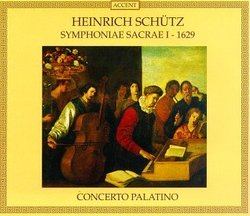| All Artists: Heinrich Schutz, Concerto Palatino, Barbara Borden, Nele Gramß, Douglas Nasrawi, John Potter Title: Heinrich Schütz: Symphoniae Sacrae, 1629 Members Wishing: 0 Total Copies: 0 Label: Accent Records Release Date: 1/1/1999 Album Type: Import Genre: Classical Styles: Opera & Classical Vocal, Historical Periods, Baroque (c.1600-1750) Number of Discs: 2 SwapaCD Credits: 2 UPC: 750582476327 |
Search - Heinrich Schutz, Concerto Palatino, Barbara Borden :: Heinrich Schütz: Symphoniae Sacrae, 1629
 | Heinrich Schutz, Concerto Palatino, Barbara Borden Heinrich Schütz: Symphoniae Sacrae, 1629 Genre: Classical
|
Larger Image |
CD Details |
CD ReviewsAs with others by Concerto Palatino, First Rate David Studhalter | North Hollywood, CA USA | 06/13/2000 (5 out of 5 stars) "These concertos are grander and more expansive than the Kleine Geistliche Konzerte of a few years later, and show Schutz at his most expressive and emotionally intense form.The performances are excellent and the sound quality very fine.What more is there to say? If you appreciate Schutz, this is a must have." The Rapture Is at Hand Giordano Bruno | Wherever I am, I am. | 02/15/2008 (5 out of 5 stars) "Last night I had the strangest dream: In my sleep, Steve Jobs came to me and commissioned me to pre-program an iPod for every living human being with the music most likely to induce Rapture. I thought hard about an assortment, but then decided that all the works of a single composer would generate a more rapturous state of mind. Ah, but which composer? I pondered over Ockeghem, Monteverdi, Bach, Beethoven, Shostakovich, and Chuck Berry, until it occurred to me that my own experience of Rapture should be my guide, at which point the choice was obvious: Heinrich Schuetz! Still in my dream, I loaded the Psalmen Davids, the Musikalishe Exequien, the Passions and Christmas Oratorio, the Geistliche Chormusik, and of course all of the Symphoniae Sacrae on my iPod prototype. Lo, as soon as Father Jobs had done his job and placed a Schuetz-loaded iPod in every person's pocket, the whole of humanity stopped its fighting and flittering and levitated rapturously into the empyrean. On the basis of my dream, I wish to nominate Bruce Dickey, the leader of Concerto Palatino, for the NOBEL PEACE PRIZE. Certainly none of the other recent winners have been nearly as eloquent. I presume that Bruce would share the booty with the other members of Palatino, and perhaps even reserve a portion for the singers on this magnificent double CD of the Symphoniae Sacrae of 1629. The Symphoniae Sacrae are essentially "chamber oratorios" - miniature masterworks for one or two voices accompanied by a few instruments and light continuo. Voices, instrumental timbres, and texts are exquisitely matched for maximum dramatic affect. Everything has to be as transparent as a mountain brook; not a single note or pitch can be masked. The instrumental parts, especially the cornetto and trombone parts, are among the most demanding and idiomatic in the repertoire of brass. That, of course, is where Bruce Dickey, Charles Toet, and the other Palatinos become necessary. Check the listings of Schuetz performances by ensembles with various names, and chances are you'll find Bruce in the band. The trombone (sacquebuche, sackbutt) is probably the wind instrument that has changed least in its history; it's largely a special-effects tool in the modern orchestra, but its role in late Renaissance and early Baroque was huge. The trombone playing on these two CDs is as elegant as you'll ever hear. The "cornetto" never seems to have changed at all. It was perfectly itself from first appearance until disapperance. Basically, it's a wooden antelope horn with finger holes and a tiny trumpet-like mouthpiece. It's expressive and flexible, it has a huge range and can be played "faster" even than a recorder flute, it has superb dynamics, but unfortunately it's durned hard to play, which partially accounts for its elimination from later Baroque ensembles. There are also violins to be heard on some of the Symphoniae, but they clearly play second fiddle to the cornetti. And pay close attention, everyone, to the bassoon (dulcian, curtal) that cavorts through several tracks. I'm surprised that I've never reviewed this performance. I've had it in my collection since it was first produced - before there was an amazon.com. IMNSHO it's still one of the most enjoyable CDs of early Baroque music available." Sublime music and perfect interpretations Steven Guy | Croydon, South Australia | 11/02/2005 (5 out of 5 stars) "This recording is a 'desert island disc' of mine. I have played it over and over again since I bought it in 1992.
There are many masterpieces here. Fili me, Absalon and Attendite, popule meus - each featuring four trombones, solo bass voice and basso continuo. Anima mea liquifacta est/Adjuro vos filiæ Jerusalem - for two mute cornetts, two tenors and basso continuo (perhaps the best work in the set?) and the extroverted Buccinate in neomenia tuba/Jubilate Deo - both parts for two tenors and bass singers, trumpet, cornett, dulcian and basso continuo. The two works for three dulcians and alto and soprano voices are very atmospheric and sensual. Some of the works feature a pair of violins accompanying the singers and these are also very beautiful works. The Symphoniæ Sacræ I of Heinrich Schütz is one of the greatest collections of works in the entire 17th century. Schütz explores a range of human emotions and moods in these works and does so with great clarity and sophistication. The performances on these two CDs are beyond reproach. I cannot recommend this recording too highly to you - it is a great recordings of great music. Believe me! " |

 Track Listings (12) - Disc #1
Track Listings (12) - Disc #1